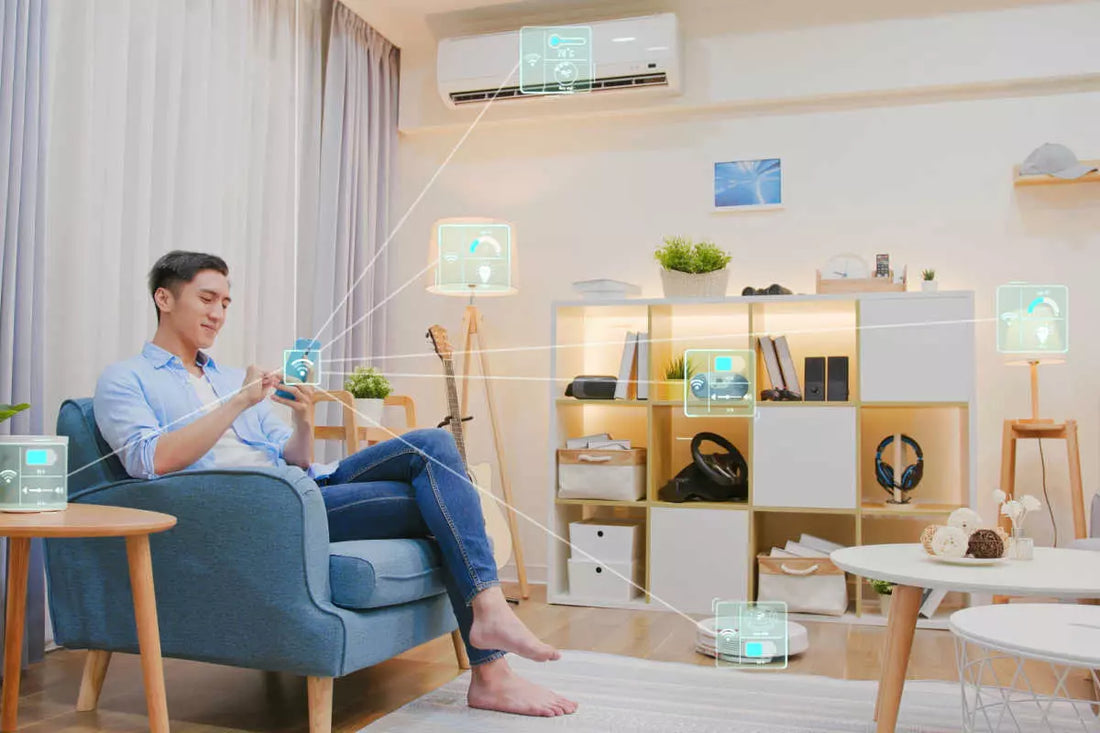
How AI is Transforming the Smart Home Industry
Share

Artificial Intelligence (AI) is reshaping industries worldwide, and the smart home sector is no exception. Once a futuristic dream, smart homes have become a reality, blending convenience, efficiency, and personalization through AI integration. This transformative technology is revolutionizing how we interact with our living spaces, creating unprecedented opportunities for innovation and investment.
For investors, the AI-driven smart home market represents a high-growth frontier. The integration of advanced AI technologies into everyday living has opened up new avenues for enhancing comfort, security, and sustainability. Let’s explore the key advancements and future potential of AI in this dynamic industry.
The Intersection of AI and Smart Homes
At the heart of smart homes lies the seamless integration of devices and systems, creating a harmonious ecosystem tailored to individual preferences. AI powers this ecosystem, enabling devices to learn, adapt, and respond to user behavior dynamically.
Imagine a home that adjusts lighting, temperature, and music to suit your mood—all without manual intervention. This is the promise of AI: a highly personalized and intuitive living experience. The convergence of AI and smart home technology not only enhances convenience but also redefines how we live, making homes more adaptive and intelligent than ever before.
Recent Advancements in AI for Smart Homes
1. Voice Assistants: The Central Hub
AI-powered voice assistants like Amazon’s Alexa, Google Assistant, and Apple’s Siri have become the cornerstone of smart home systems. These devices enable natural language communication, making it easier than ever to control lights, thermostats, appliances, and even security systems with simple voice commands.
Notably, Josh.ai has taken voice assistance to the next level by integrating ChatGPT-powered natural language processing (NLP). This innovation allows voice assistants to grasp and interpret conversations with greater context and depth, enabling more intuitive interactions.
For investors, advancements in NLP and conversational AI signal an expanding market for voice-controlled home automation.
2. Predictive Analytics: A Smarter Home Experience
Predictive analytics is transforming smart homes by enabling devices to anticipate and adapt to user needs. Smart thermostats, for example, learn daily routines to optimize temperature settings automatically, improving comfort and reducing energy costs.
A groundbreaking development is Amazon’s integration of a generative AI large language model (LLM) into Alexa. This upgrade allows Alexa to understand conversational nuances and manage smart devices proactively. Predictive capabilities now extend to suggesting restaurant reservations or adjusting lighting based on real-time weather conditions.
For businesses and investors, predictive analytics offers a pathway to innovation, efficiency, and customer loyalty, making it a cornerstone of the smart home market’s evolution.
3. Home Security: AI at the Frontline
AI-powered security systems represent a leap forward in home protection. Leveraging facial recognition, motion detection, and machine learning, these systems can differentiate between family members and potential intruders, reducing false alarms and ensuring accurate alerts.
For example, Philips’ entry into the Indian market with AI-driven security cameras highlights the growing demand for sophisticated home security solutions. These devices not only enhance safety but also appeal to homeowners seeking peace of mind and convenience.
With increasing consumer awareness around security, AI-driven systems are poised to dominate the market, offering lucrative opportunities for investors in this space.
4. Energy Efficiency: A Sustainable Smart Home
AI-driven energy management systems are revolutionizing how homes consume and conserve energy. By analyzing real-time data and user behavior, smart devices can optimize energy usage, reducing waste and utility costs.
Some systems even integrate with renewable energy sources like solar panels, aligning with the global push for sustainability. For instance, AI-enabled smart appliances can prioritize energy efficiency without compromising performance, appealing to eco-conscious consumers.
This focus on sustainability positions the smart home market as a critical player in the transition to green energy, making it an attractive domain for forward-thinking investors.
Future Prospects for AI in Smart Homes
The future of AI in smart homes is bright, with exciting developments on the horizon:
· Enhanced Interactivity: Voice recognition and NLP will continue to improve, making interactions with devices more natural and seamless.
· Advanced Security: AI will enable smarter surveillance systems capable of predicting and preventing potential threats.
· Sustainable Living: Homes will integrate renewable energy sources and AI-driven systems to minimize environmental impact.
· Health Monitoring: AI will power devices that monitor health metrics, enabling proactive care within the home.
As these advancements unfold, smart homes will evolve into personalized sanctuaries that enhance quality of life, setting the stage for further market growth.
Why Investors Should Pay Attention
The AI-powered smart home industry is more than just a technological marvel—it’s a lucrative investment opportunity. Key drivers include:
· Consumer Demand: Growing interest in convenience, security, and sustainability.
· Technological Advancements: Rapid innovations in AI, IoT, and renewable energy integration.
· Market Expansion: Increasing adoption in emerging markets, creating vast potential for global growth.
With the global smart home market expected to witness exponential growth, early investment in AI-driven technologies could yield significant returns.
Conclusion: A Transformative Era
AI is revolutionizing the smart home industry, transforming homes into intelligent ecosystems that enhance convenience, security, and sustainability. From voice assistants and predictive analytics to advanced security systems and energy-efficient solutions, the possibilities are boundless.
For investors, the AI-driven smart home sector offers unparalleled opportunities to capitalize on cutting-edge innovation. As technology continues to evolve, smart homes will not only redefine how we live but also set a new standard for the integration of AI into everyday life.